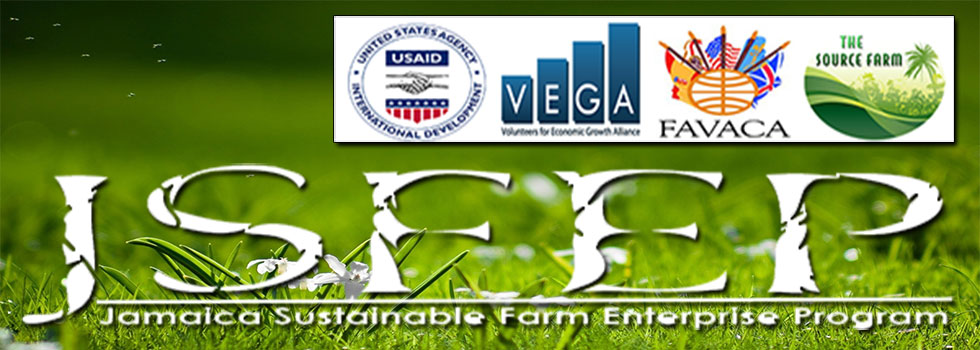The people of Jamaica and the greater Caribbean region have long been buffeted by manmade and natural disasters that have left them in a state of economic, social, and environmental crisis. Each country has its own story, but their histories follow a pattern of boom and bust cycles tied to global commodities and international banking agreements that lock them into poorly planned and unsustainable agricultural practices, global price and market competition, and uneconomic local market supply chains. Jamaica is a classic example of this pattern and her people are vulnerable due to national dependency on unaffordable, less healthy, imported food, lost skill sets needed to produce certain crops without expensive chemical inputs, and natural disasters that wipe out farmers crops with regularity.
The Parish of St. Thomas and the other eastern parish of Portland have systemically been the most forgotten and underdeveloped parishes in Jamaica for over a century. Because of the Morant Bay Rebellion in 1865, St. Thomas was labeled as a “troublemaker parish” by government and has suffered from little to no effective representation by both the past and present governments of Jamaica. This neglect has resulted in poorly maintained roads, lack of functional infrastructure, high unemployment, poor living conditions, and a great sense of hopelessness amongst the youth. St. Thomas is a farming parish however, since the liberalization of the banana industry by the European Union and NAFTA all the banana plantations have closed leaving few agricultural avenues for profitable employment in the parish. Many of the people of St. Thomas still rely on small cash crops and seasonal tree crop production for their livelihood, but are only marginally compensated for their crops, with most of the profits going to middlemen and retailers in Kingston and local markets.
These challenges are magnified by the rising cost, economically and environmentally, of conventional agricultural inputs, the environmental damage caused by poor farming practices on hillsides, and agricultural trade policies that are unfavorable to small farmers. There are two primary ways to solve these problems:
- Focus on local sustainable production to increase food security
- Develop high value internal and export markets to increase agricultural profitability.
Permaculture and organic (POF) systems provide solid foundations for these solutions. Permaculture provides a sustainable land and farm ecosystem design focus and organic agriculture practices and markets provide the economic, social, and environmental benefits.
The Jamaican agriculture industry is faced with the challenge and opportunity arising from a growing demand for organic healthy produce. Currently a limited number of farmers are growing organically. While the demand for organic crops has expanded rapidly over the past 20 years in developed nations, Jamaica is just beginning to see significant on-island demand. There is a long history of support for clean food and organic agriculture in Jamaica and farmers are thirsty for new effective methods of improving production and distribution. Marketing structures are in their infancy and need direct technical assistance to support their success.
The Source Farm Foundation (SFF), our partner in Jamaica, has been working for the past two years to provide training in Permaculture, organic farming, farm economics, and market development for young and beginning farmers. Ten individuals have completed the first round of trainings (One One Coco program) and have begun working together to fill the gap in organic production. Jamaica’s first “Organic” market, Ujima Natural Farmers Market was launched by the SFF in February 2014 in Kingston to provide an economic outlet for these early producers. Demand is already outstripping supply at that market. SFF has developed strong linkages with the Jamaica Organic Agriculture Movement (JOAM), the Ministry of Agriculture, and the Rural Agricultural Development Authority (the Government of Jamaica’s extension service), as well as practicing small organic farmers around the country and parish.
The Jamaican Sustainable Farm Enterprise (JSFE) builds on this foundation by linking Southeastern U.S. organic farmers and permaculturists with their Jamaican counterparts with the intention of enhancing the development and adoption of Permaculture and organic farming systems and the business models that are necessary for small Jamaican farmers to succeed financially, socially, and environmentally.
Objectives
The goal of this project is to help build local, ecologically based, disaster resistant organic food systems in Jamaica through technology transfer and management expertise that links farmers to markets. The JSFE will develop market driven organic production, certification, and distribution systems for agricultural products that will sustainably reduce food insecurity and poverty. Small landholder farmers and existing organic producers will increase their food production and farm management skills while enhancing the natural resource base and building disaster resistant agricultural environments by adopting Permaculture and Organic Farming (POF) systems.
The program will place 70 volunteers over 3.5 years for training some 2,500 individuals in total. Key Performance Indicators for program impacts and outcomes include:
- Increase the Value of Annual Gross Sales (Revenue) to 1.3 million USD.
- Increase farmer Annual Net Income to 1 million USD.
- Establish or improve six host business plans or organization policies and procedures.
- Provide training and technical assistance to enable 18 hosts to cultivate using Certifiable Organic Methods
- Train 150 new, start-up, or existing farmers cultivating .4 to 1 hector organic production.
- Establish a sustainable affordable distribution network for organic produce
- Establish 550 hectares under improved production technology
- Bring 150 new or existing farmers to the point of selling organic products at market.
The program will implement an innovative approach to sourcing volunteers by tapping into the highly successful organic and Permaculture communities in the southeastern U.S. which share similar climatic conditions during the growing season with the Caribbean. There are many direct market links to be explored and developed between the Southeast U.S. and Jamaica and the program will foster stronger cultural and economic links between these two regions. The program will seek to utilize the collective experience and knowledge of these communities in building sustainable food systems, businesses, institutions, and organizations in Jamaica.
Proposed Activities
Sustainable food systems are generally defined as meeting three criteria; ecologically sound, socially just, and economically viable. An organic production, certification, and distribution system has the potential to embody these principles in the form of a functional and profitable organization. The development of an organic production, certification, and distribution system is challenging in that it is comprised of many activities that need to happen in a synchronized fashion. The activities fall into four core areas:
- Develop capacity to promote POF systems
- Develop, demonstrate, and document profitable POF production systems
- Establish organic certification system suited to serve small holders effectively
- Establish efficient market system for POF production
Develop capacity to promote POF systems
Volunteers will provide technical support to:
- Evaluate the Source Farm Foundation’s current capacities for education and promotion and develop a plan for improvement and growth.
- Assist existing and emerging organic grower groups in developing their organizational structures and management strategies.
- Provide workshops on POF at the College of Agriculture, Science, and Education (CASE), SFF, and other locations across Jamaica.
Develop, demonstrate, and document profitable POF production systems
Volunteers will provide technical support to:
- Train farmers in Permaculture design principles so they can develop site plans and maps for their farms.
- Guide the farmers through a process of developing enterprise budgets and production plans for each crop, which will be merged with their farm plan into an individualized whole farm budget.
- Assist the farmers and grower groups in developing tools for analyzing profitability
- Assist SFF and CASE in developing POF educational and research resource centers
- Assist SFF in developing systems for collecting data that document the financial impacts of the project.
Support the development of an organic certification system suited to serve small holders effectively
Volunteers will provide technical support to:
- Evaluate the current organic certification system in Jamaica
- Explore the best examples of group certification systems in other countries
- Develop a plan for establishing a group certification system
- Assist SFF in developing proposals for funding the establishment of a group organic certification system
Establish efficient, fair, and transparent marketing and distribution systems for POF production
Volunteers will provide technical support to:
- Evaluate the current Ujima Farmer’s market and develop plans for improved organizational structure, management, and expansion.
- Explore the best examples of efficient, fair, and transparent marketing and distribution systems in other countries
- Develop a plan for establishing an efficient, fair, and transparent marketing and distribution systems
- Assist SFF in developing proposals for funding the establishment of an efficient, fair, and transparent marketing and distribution systems
Partner Organizations
The program is supported through funding provided by the U. S. Agency of International Development (USAID) John Ogonowski and Doug Bereuter Farmer-to-Farmer Program and is administered by Volunteers for Economic Growth Alliance (VEGA).
Florida Association for Volunteer Action in the Caribbean and the Americas (FAVACA) manages the JSFE project. FAVACA’s mission is to improve social and economic conditions in the Caribbean and the Americas through volunteer service. www.favaca.org.
The Source Farm Foundation (SFF) manages the project in Jamaica and is a non- profit community economic development incubator that seeks to build collaborative partnerships to develop innovative and sustainable solutions for the parish of St. Thomas and beyond. SFF works with local and international farmers to create exchanges around sustainable land practices, organic farming and appropriate technology.
Chuck Marsh is joint Program Coordinator for the program and has been active in the alternative and ecological agriculture movements since the mid 70’s and has been a leader in the international Permaculture movement since 1981. Chuck co-founded and designed Earthaven Ecovillage near Black Mountain, NC and has been the village designer, land planner, and Permaculture consultant for Source Farm Ecovillage in Jamaica since 2007. www.livingsystemsdesign.net
Tony Kleese is also a joint Program Coordinator for this program. He has been active in the development of local and organic food systems in the Carolinas as a farmer and a new agrarian activist since 1989. www.earthwiseorganics.com,
Jimmy Buffett’s Singing for Change Foundation has provided funding to support activities in the project that can’t be funded by the USAID funds. A micro-loan program has been established to help the farmers purchase the equipment and seeds they need for their organic operations.
Feature 2
The following is placeholder text known as “lorem ipsum,” which is scrambled Latin used by designers to mimic real copy. Donec eget risus diam. Vivamus a ante congue, porta nunc nec, hendrerit turpis. Fusce at massa nec sapien auctor gravida in in tellus.
Feature 3
The following is placeholder text known as “lorem ipsum,” which is scrambled Latin used by designers to mimic real copy. Vestibulum ante ipsum primis in faucibus orci luctus et ultrices posuere cubilia Curae. Sed a ligula quis sapien lacinia egestas.


